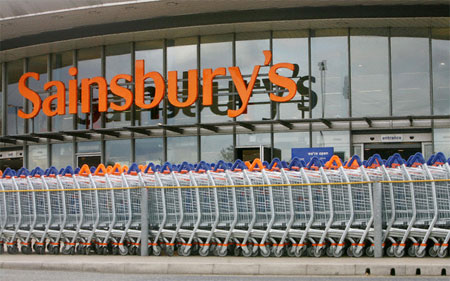By
Reuters
Reuters
Published
Jun 16, 2010
Jun 16, 2010
Sainsbury trumpets gains vs rivals in a tough market
By
Reuters
Reuters
Published
Jun 16, 2010
Jun 16, 2010
LONDON, June 16 (Reuters) - New stores, online sales and demand for non-food items such as the vuvuzela trumpets made popular by the soccer World Cup are helping British grocer J Sainsbury (SBRY.L) to take share in a tough market.
 |
The country's third-biggest supermarket group behind market leader Tesco (TSCO.L) and Asda (WMT.N) reported on Wednesday the smallest rise in underlying sales for over five years, hit by a steep drop in food price inflation and a jump in petrol prices that left shoppers with less to spend on groceries.
Chief Executive Justin King said there was little prospect of much improvement in the next two quarters, with the government expected to hike taxes and cut public spending in an emergency budget next week aimed at reining in borrowing.
But he also said Sainsbury's was well placed to cope, helped by a surge in popularity of its Nectar loyalty card as well as its plans to open new stores and expand in general merchandise.
"(We're) at the front of the pack," King told reporters, comparing Sainsbury's performance with its bigger rivals.
At 0820 GMT, Sainsbury shares were up 0.7 percent at 326.8 pence, outperforming a 0.1 percent fall on the STOXX 600 European retail index .SXRP.
"Sound trading against the backdrop of tough comparatives," said Shore Capital analyst Clive Black, noting that Sainsbury's had turned in very strong figures in the same period last year.
NO PICK UP
Sainsbury, which runs about 525 supermarkets and 300 convenience stores, said sales at stores open at least a year rose 1.1 percent excluding fuel, but including VAT sales tax, in the 12 weeks to June 12.
That was broadly in line with analysts' forecasts in a Reuters poll and comparable to a similar figure reported by Tesco on Tuesday, though Tesco does not adjust its sales for an accounting rule covering loyalty cards, which analysts say would slightly depress its growth.
King struck a slightly more cautious tone than Tesco, which said it saw signs that consumer confidence was building.
"We don't see there's been a step up (in confidence) in any way," he told reporters on a conference call.
"Low to no growth supported by low to no (food price) inflation is the outlook for the next quarter or two."
Earlier on Wednesday, a survey showed UK consumer confidence at its lowest level in almost a year in May.
Sainsbury's total sales rose 7.6 percent, boosted by a 3.3 percent contribution from new selling space, which the group said was performing ahead of its expectations.
Online grocery sales were up almost 20 percent, while non-food sales grew at almost four times the rate of food, and the group said it had over 800,000 more regular users of its Nectar loyalty card than at the same time last year.
The rise in non-food sales included a surge in demand for vuvuzelas, the 2-pound ($2.97) plastic trumpets providing the soundtrack to every game at the soccer World Cup in South Africa.
King said the group had sold around 50,000 vuvuzelas, and expected to sell out its stock of 70,000 within 48 hours.
Arden Partners analyst Nick Bubb was a little disappointed, however, saying he had expected Sainsbury would do a little better than Tesco because its first quarter included the two weeks immediately before the World Cup.
Sainsbury is periodically the subject of speculation that the Qatar Investment Authority (QIA), which owns about 26 percent of the business following a failed takeover attempt in 2007, might make a fresh bid for the business.
King said he had "no indication whatsoever" that the QIA had changed its stance from being a supportive, long-term investor.
(Additional reporting by James Davey and Jon Hopkins; Editing by Paul Sandle and Will Waterman) ($1=.6746 Pound)
© Thomson Reuters 2024 All rights reserved.
























